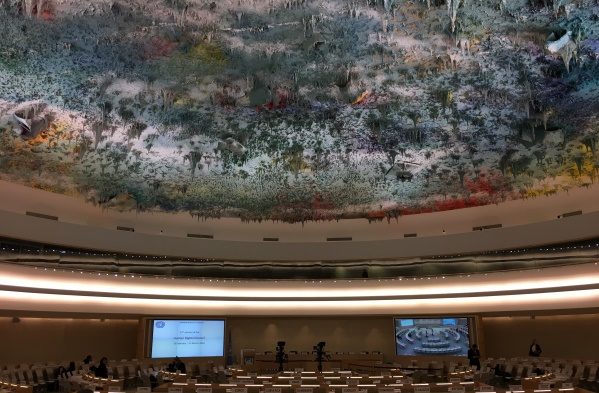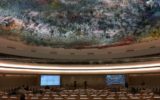
From 26 February to 23 March 2018, Americans for Democracy & Human Rights in Bahrain (ADHRB) participated in the 37th Session of the United Nations Human Rights Council (HRC) in Geneva to bring increased attention to the ongoing human rights abuses in Bahrain, Saudi Arabia, and other countries of the Gulf Cooperation Council (GCC). Over the course of the four-week session ADHRB delivered 24 interventions and organized three side events. ADHRB was pleased to hear Bahraini and Saudi human rights concerns raised by UN officials and State missions, and welcomed their calls for reform, and criticisms of abuses. ADHRB’s delegation held dozens of meetings with state diplomats, UN officials, Special Procedures mandate holders, and civil society partners to address targeting human rights defenders, reprisals, impunity, and closing civil and political space in Bahrain, and executions, women’s rights and targeting activists in Saudi Arabia.
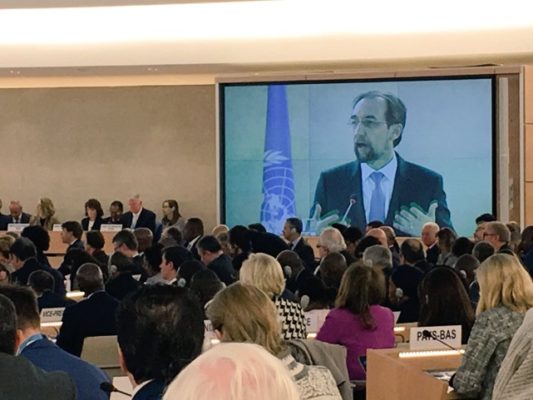
On 27 February, ADHRB responded to remarks made by Saudi Arabia’s Foreign Minister, Adel al-Jubeir, during the high-level segment. ADHRB highlighted Al-Jubeir’s refusal to speak about Saudi abuses in Yemen or domestic human rights concerns, including the detention of dozens of human rights activists, academics, intellectuals, and peaceful dissidents.
The following day, on 28 February, ADHRB responded to the statement made by Bahrain’s Deputy Foreign Minister, Mr. Abdulla Faisal al-Doseri, during the high-level segment. ADHRB raised concerns regarding al-Doseri’s inaccurate and exaggerated claims and his neglect to address ongoing and systematic human rights violations in the country. ADHRB stressed how the past year was one of the worst for human rights in Bahrain and raised the cases of human rights defenders like Abdulhadi al-Khawaja and Nabeel Rajab who are serving prison sentences related to their activism, and political leaders like Hasan Mushaima, Abdulwahab Hussain, and Sheikh Ali Salman who have been prosecuted for dissenting opinions.
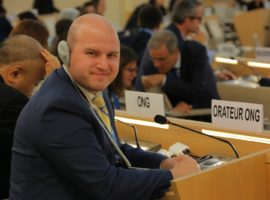
On Thursday 1 March, ADHRB Director of Advocacy Michael Payne delivered ADHRB’s first oral intervention under HRC Item 3’s clustered interactive dialogue with the Independent Expert on Foreign Debt, raising concerns that other GCC states, including Saudi Arabia and the United Arab Emirates, were financially supporting Bahrain in exchange for Bahraini support for their intervention in Yemen. He also noted Bahrain’s use of the support to increasingly suppress dissent at home.
On 2 March, ADHRB delivered an oral intervention during the Item 3 clustered interactive dialogue with the Special Rapporteur on promoting human rights while countering terrorism. In the intervention, ADHRB addressed the Rapporteur on countering terrorism concerning Saudi Arabia’s use of counterterrorism laws to sentence human rights defenders and peaceful activists, raising the cases of Mohammed al-Otaibi, Abdullah al-Attawi, Essam Koshak and Naimah al-Matrod among others.
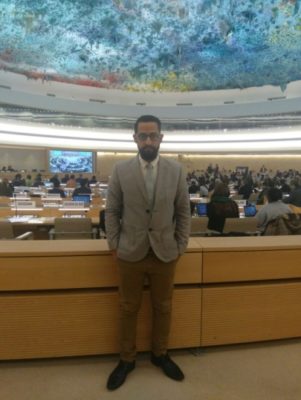
Also on 2 March, Yusuf al-Hoori delivered an intervention on behalf of ADHRB during the Item 3 clustered interactive dialogue featuring the Rapporteur on truth, justice, and reparations. Al-Hoori’s intervention looked at the challenges awaiting Yemen in the post-conflict stage due to the devastation of Yemeni society, massive humanitarian crisis, and increasing fragmentation of the country into different spheres of influence.
The same day, al-Hoori delivered another oral intervention under the Council’s Item 3 interactive dialogue with the Special Rapporteur on freedom of religion. In his intervention, al-Hoori called attention to the Government of Bahrain’s structural discrimination against its Shia majority population, in particular in the sectarian divisions in the security forces and in restricting Friday prayers in Sheikh Isa Qassim’s village of Diraz.
On Monday 5 March, Duaa Dhainy, of the European Saudi Organization for Human Rights (ESOHR), delivered an oral intervention for ADHRB during the Panel on the Rights of the Child. In her intervention, she discussed the effects of the Saudi war in Yemen on children – including severe malnutrition, stunted growth, and delayed cognitive development. Cholera, malaria and diphtheria are affecting young children and more than 11 million children are in need of humanitarian assistance.
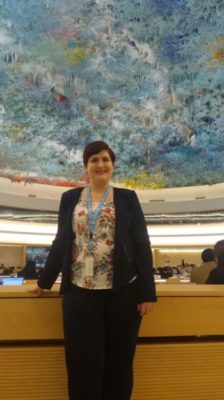
Also on 5 March, ADHRB’s Legal Fellow Bridget Quitter delivered an oral during the clustered interactive dialogue with the Special Rapporteurs on the right to food, and the environment. In her intervention, Quitter raised the effects of Bahrain’s vast industrial complex in the village of Ma’ameer on the high levels of pollution found in the area and leading to negative effects on the area’s children. She also highlighted how there have been some environmental activists in Bahrain who have campaigned for Ma’ameer’s pollution to be addressed by the government, and one such activist, Mohamed Khadim Muhsin Zain Aldeen, was among five protestors shot and killed when Bahraini security forces raided a sit-in in the village of Duraz in May 2017.
The following day, Legal Fellow Bridget Quitter delivered an intervention during the clustered interactive dialogue with the Special Rapporteurs on privacy and sale of children. In her intervention, she raised the Bahraini and Emirati government’s use of cyber technology to spy on their citizens, in particular human rights and civil society activists. Quitter raised the case of the Bahraini government using the malicious FinFisher software in 2014 to monitor the emails, texts, and WhatsApp messages of prominent Bahraini human rights defenders, including Ala’a Shehabi, Husain Abdulla (the Executive Director of ADHRB), and Shehab Hashem.
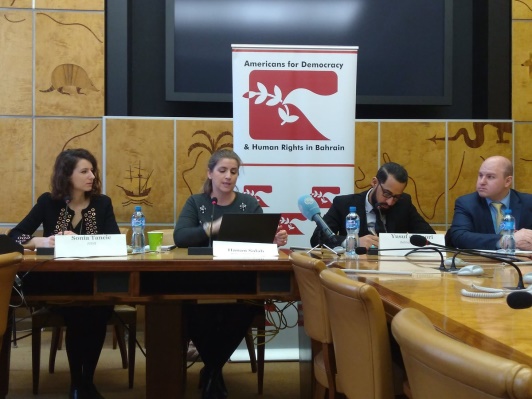
On 6 March, ADHRB hosted their first panel entitled “A Principled Case for Bahrain” which focused on the deteriorating human rights situation in Bahrain and the proposed framework under which the Human Rights Council can address human rights violations in Bahrain through a set of objective criteria. The event was cosponsored by Human Rights Watch, the European Center for Democracy and Human Rights (ECDHR), Pen International, Reporters Without Borders, CIVICUS, IFEX, Committee to Protect Journalists (CPJ), FIDH, and the Bahrain Institute for Rights and Democracy (BIRD). The event was moderated by Sonia Tancic from FIDH, and speakers included Hanan Salah, a researcher for Human Rights Watch; Yusuf al-Hoori, a Bahraini activist; and Michael Payne, the Director of Advocacy for ADHRB.
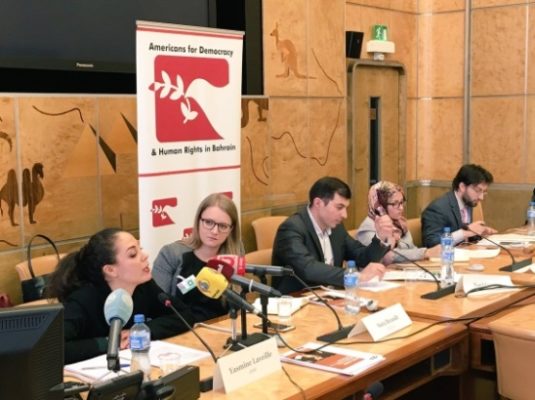
ADHRB’s second panel, “Persecution of Activists in Saudi Arabia”, was held on 7 March. This event was co-sponsored by CIVICUS, ECHDHR, the European Saudi Organization for Human Rights (ESOHR), PEN International, English PEN, Gulf Center for Human Rights, International Service for Human Rights (ISHR), Reporters Without Borders, ALQST, the International Federation for Human Rights (FIDH), and Index on Censorship. The event was moderated by Tyler Pry of ADHRB and speakers included Yasmine Laveille of FIDH, Duaa Dhainy of ESOHR, Nael Georges of PEN International, and Sara Brandt of CIVICUS. The panel highlighted violations of the right to freedom of expression in Saudi Arabia and the lack of open space for civil society.
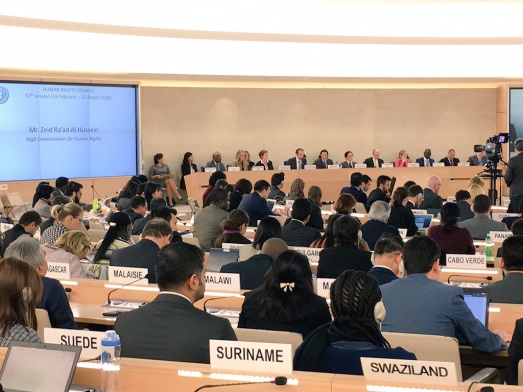
On Wednesday 7 March, Duaa Dhainy of the European Saudi Organisation for Human Rights delivered an oral intervention on behalf of ADHRB during the Item 3 interactive dialogue with the Special Rapporteurs on albinism and disabilities. In her intervention, she addressed the case of Saudi citizen Munir Al-Adam, a young, disabled man who has been sentenced to death and is at imminent risk of execution.
On Thursday 8 March, ADHRB’s Director of Advocacy, Michael Payne, delivered an intervention during the Item 2 Interactive Dialogue with the High Commissioner for Human Rights in which he welcomed the High Commissioner’s continued efforts to highlight the human rights situation in Bahrain. Payne commended the High Commissioner for his repeated highlighting of Bahraini Nabeel Rajab’s recent sentencing to 5 years in prison for tweets criticizing torture in Bahrain’s prisons and the humanitarian catastrophe in Yemen. Payne also asked the High Commissioner what fundamental steps he would recommend that Bahrain take to address the deep trust deficit between much of Bahraini society and their government, to which the Commissioner responded that the Bahraini government must release political prisoners and create a secure environment in which civil society can operate without fear of reprisals.
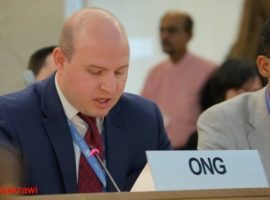
On 9 March, Director of Advocacy Michael Payne delivered an oral intervention during the Item 3 General Debate on torture and ill-treatment against political activists and human rights defenders in Bahrain. In his intervention, Payne raised the cases of rights defenders Nabeel Rajab, Dr. Abduljalil al-Singace, and Abdulhadi al-Khawaja, and political activists and leaders Abdulwahab Hussain and Hasan Mushaima, all of whom have been denied necessary medical care.
In a second intervention delivered on 9 March, Legal Fellow Bridget Quitter addressed the Council under the Item 3 General Debate. In her intervention, Quitter raised concerns over Bahrain’s targeting of women’s activists for reprisals, in particular Ebtisam al-Saegh. She also called to attention the recent sentencing of Medina Ali and three other women by a Bahraini court to three years in prison after trials marred by reports of torture and forced confessions.
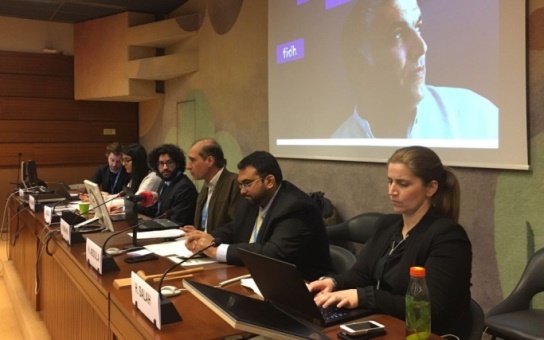
On Tuesday 13 March, ADHRB participated in a joint side event organized by the Gulf Center for Human Rights and CIVICUS, which focused on Bahrain’s judiciary. Cosponsoring the event was the Bahrain Center for Human Rights, Human Rights Watch, International Service for Human Rights, Committee to Protect Journalists, Federation of International Human Rights Leagues (FIDH), OMCT, PEN International, and Reporters without Borders. The panel was moderated by Husain Abdulla, ADHRB’s Executive Director, and featured Khalid Ibrahim, the Executive Director of the Gulf Center for Human Rights, Hanan Salah, the Bahrain researcher at Human Rights Watch, Justin Shilad, the MENA research associate with the Committee to Protect Journalists, Antoine Madelin, FIDH’s director of international advocacy, a short video message from Michel Forst, the special rapporteur on human rights defenders, and remarks delivered on behalf of Sheikh Maytham al-Salman, a Bahrain interfaith activist.
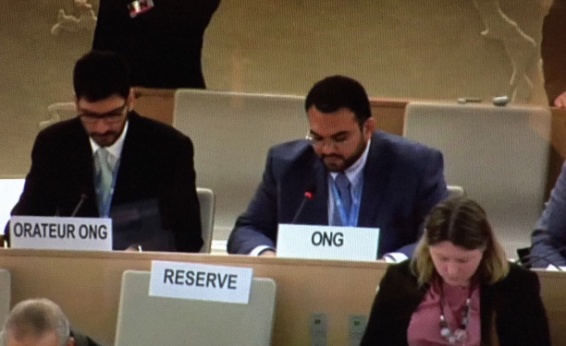
On 14 March, ADHRB Executive Director, Husain Abdulla, delivered an intervention raising an extended list of human rights concerns in Bahrain during the Item 4 general debate. Abdulla raised the cases of imprisoned human rights defenders, the targeting of political leaders and the broader issues of closing civil society and political space in Bahrain.
Later that day, ADHRB’s Saudi Advocacy Associate, Tyler Pry, delivered an intervention during the Item 4 debate addressing Saudi Arabia’s war in Yemen. In the intervention, Pry called the Council’s attention to the actions of Saudi Arabia and its coalition partners in Yemen and the toll of the kingdom’s actions on millions of Yemeni civilians, while also calling on the Council to sanction Mohammed bin Salman and expel Saudi Arabia from the Council.
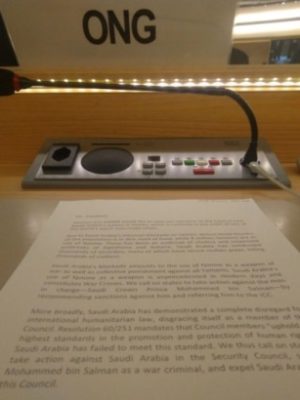
Also on 14 March, Bridget Quitter delivered an oral intervention on behalf of ADHRB during the Item 4 General Debate. In her intervention, Quitter addressed the horrendous conditions inside Bahrain’s Jau prison and Bahraini authorities’ denial of necessary medical care for prisoners, in particular detained human rights defenders and political activists. She called to attention the specific cases of human rights defenders Abdulhadi al-Khawaja and Abduljalil al-Singace, and political leaders Hassan Mushaima and Abdulwahab Hussain, who have all been denied necessary medical care during detention in Jau.
ADHRB’s Saudi Advocacy Associate, Tyler Pry, delivered another intervention on 14 March during the Interactive Dialogue with the Special Rapporteur on minorities. In his intervention Pry discussed Saudi Arabia’s systematic discrimination against its Shia minority population, in particular through education and the schools. He also noted the increase of hate speech from clerics on social media.
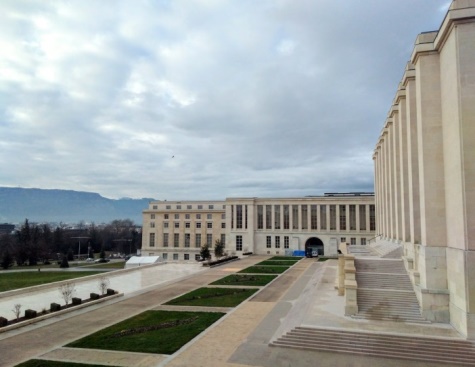
The following day, 15 March, during the Item 5 General Debate, Yusuf al-Hoori delivered an oral intervention on reprisals by states against human rights defenders and civil society activists for their work with the Human Rights Council and its mechanisms, naming Ebtisam al-Saegh who faced intimidation, arson attacks, arrest, interrogation, torture, sexual assault, and fabricated terrorism charges for her participation in HRC 33 and Bahrain’s 3rd UPR. Al-Hoori also highlighted how exiled HRDs like Sayed Ahmed Alwadaei have had their family members in Bahrain targeted in retaliation for their international activism.
Also on 15 March, Tyler Pry, delivered an oral intervention under the Item 5 General Debate. In his intervention, Pry noted the necessary membership standards of the Human Rights Council as upholding exemplary standards of human rights, and that Saudi Arabia has failed to meet these standards. Specifically, Saudi Arabia has refused to engage with UN mechanisms, including by buying its way off a UN blacklist of states accused of violating children’s rights.
At the start of the next week, on 19 March Yusuf al-Hoori delivered an oral intervention during the Item 6 General Debate on the Government of Bahrain’s refusal to implement its 3rd cycle Universal Periodic Review (UPR) recommendations. Al-Hoori noted that states recommended 176 reforms, including several in impunity, but that Bahrain brushed them off in a demonstration that it does not take the UPR process seriously.
In a second intervention delivered on 19 March, Advocacy Associate Tyler Pry addressed the Council under Item 6 General Debate. His intervention addressed the United Arab Emirates’ refusal to implement its free expression, free assembly, and free association related Universal Periodic Review (UPR) recommendations, and also called attention to the ongoing detention of rights defender Ahmed Mansoor and economist Dr. Nasser bin Ghaith.
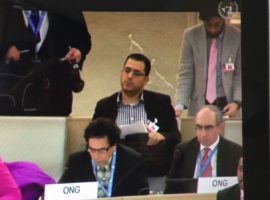
On Tuesday 20 March, Hany Alrayes delivered an oral intervention on behalf of ADHRB during the Item 8 General Debate on the topic of the Vienna Declaration and Programme of Action. In his intervention, Alrayes spoke about Bahrain’s use of torture and coerced confessions in leading to death sentences, mentioning the cases of Maher al-Khabbaz, Mohammad Ramadan and Husain Ali Moosa.
Also on 20 March, Tyler Pry delivered an oral intervention during the Item 8 General Debate on behalf of ADHRB. In his intervention, Pry discussed impunity for crimes committed by the Bahraini government against journalists in the context of the Vienna Declaration and Programme of Action. Pry raised the cases of al-Wasat co-founder Kareem Fakhrawi and videographer Ahmed Ismail Hassan, both of whom were killed by government forces.
Tyler Pry delivered a second intervention on 20 March during the Item 9 General Debate. In his intervention he discussed the Durban Declaration and Programme of Action and Saudi Arabia’s discrimination against its religious minorities, in particular its Shia population. Pry also raised the issue that of the 45 men on death row for political crimes related to freedom of expression, assembly, and association, and religion, all of them are members of the Shia community, which is not a coincidence.
Finally, on 20 March, during the Item 9 General Debate Yusuf al-Hoori delivered on oral intervention on the Durban Declaration on Programme of Action and Bahrain’s systematic, state-sponsored sectarian discrimination against its Shia majority population. He focused in particular on sectarian discrimination in Bahrain’s security services and the implications of this state policy.
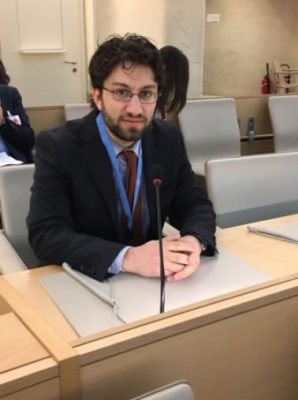
On 22 March, ADHRB’s Saudi Advocacy Associate Tyler Pry delivered an oral intervention during the Item 10 General Debate on technical capacity building in Yemen. In his intervention Pry raised the difficulty of implementing technical cooperation programs given the continuing conflict, humanitarian crisis, and fragmentation of the country. He stressed how rather than working to end the war and clear the way for the successful implementation of the program of technical cooperation, Saudi Arabia and its allies, most prominently the United Arab Emirates have caused a sharp deterioration in the conflict.
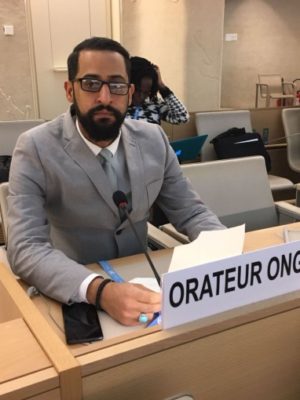
Yusuf al-Hoori delivered ADHRB’s last intervention of the 37th Session of the United Nations Human Rights Council. Al-Hoori raised concerns regarding Bahrain’s failure to cooperate with OHCHR to address the deteriorating human rights situation in Bahrain. Specifically, he addressed Bahrain’s refusal to engage with Special Procedures in good faith. In recent years, Bahrain has twice cancelled the visit of the previous Special Rapporteur on torture, and no Special Procedures mechanism has been permitted to visit Bahrain since 2006.
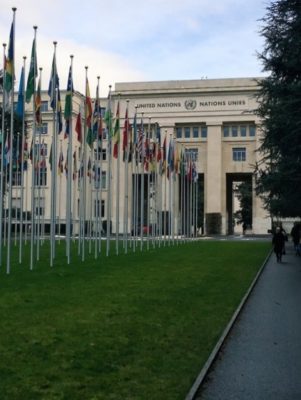
ADHRB would like to note the 37th Session of the United Nations Human Rights Council marks the sixth consecutive Council session in which cases of reprisals against civil society members in relation to the work of the Human Rights Council have been reported. Specifically, 13 Bahraini human rights defenders, activists, doctors, and lawyers from the Kingdom of Bahrain reported being affected so far this year. Bahrain has a history of implementing widespread travel bans affecting a wide range of civil society and unfortunately these trends have only continued into 2018.
For a PDF of this statement, please click here.


